You’ll make a meaningful impact by choosing ethical gold for your artisan jewelry because it guarantees fair labor practices, environmental protection, and community empowerment. Fairtrade Gold gives miners 99% of gold’s spot value while generating $2000 per kilo for healthcare and education projects. Unlike traditional mining that destroys ecosystems and displaces communities, ethical gold supports sustainable techniques and democratic governance. This choice distinguishes your pieces from those using “dirty gold” with unknown origins that perpetuate ecological destruction and human rights abuses, while building stronger consumer trust through transparent sourcing.
What Makes Gold “Ethical” in Today’s Jewelry Market
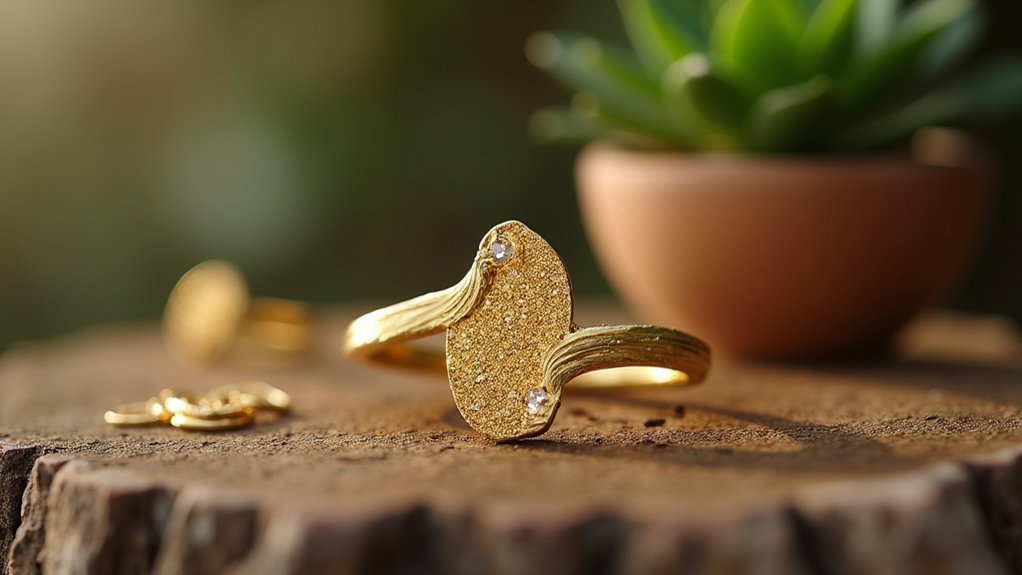
When you’re shopping for artisan jewelry, understanding what makes gold “ethical” can transform your purchasing decisions from supporting potentially harmful practices to championing responsible mining.
Ethical gold stems from mines that maintain strict labor and environmental standards, ensuring miners receive fair wages and work in safe conditions. Fairtrade Gold initiatives exemplify this by providing miners with approximately 99% of gold’s spot value.
Fairtrade Gold ensures miners earn nearly full spot value while maintaining safe working conditions and environmental responsibility.
You’ll want to avoid “dirty gold” – sourcing with unknown origins often linked to ecological destruction and human rights abuses.
While recycled gold jewelry appears eco-friendly, it doesn’t guarantee ethical origins without transparent supply chain documentation.
True ethical gold supports fair labor practices, generates less environmental waste through regulated small-scale operations, and contributes to community development projects in mining regions.
The Environmental Cost of Traditional Gold Mining
When you purchase traditional gold jewelry, you’re unknowingly supporting an industry that destroys vast ecosystems through deforestation—losing up to 20 tons of earth for a single wedding ring.
You’re also contributing to toxic chemical contamination as mining operations release mercury and cyanide into water sources, poisoning communities for generations.
Most critically, you’re enabling the displacement of local populations who lose their homes and livelihoods to make way for mining operations.
Ecosystem Destruction and Deforestation
Behind every gleaming piece of gold jewelry lies a trail of environmental devastation that most consumers never see. When you purchase traditional gold, you’re unknowingly contributing to massive ecosystem destruction that spans continents.
Gold mining requires removing 20 tons of earth for just one wedding ring, causing widespread deforestation across critical habitats. The Amazon rainforest alone lost 4,500 square miles between 2005 and 2015 due to mineral extraction.
This deforestation doesn’t just eliminate trees—it destroys entire ecosystems that’ve taken centuries to develop. You’re witnessing the collapse of biodiversity hotspots where countless species lose their homes forever.
The environmental impact extends beyond visible destruction. Mining operations strip fertile topsoil, leaving behind barren landscapes incapable of supporting life, fundamentally altering regional ecosystems permanently.
Toxic Chemical Contamination
While deforestation creates visible scars across landscapes, the invisible chemical assault from traditional gold mining poses an even deadlier threat to human health and environmental stability. When you purchase conventionally mined gold, you’re supporting practices that release mercury, cyanide, and arsenic into water systems.
| Chemical Pollutant | Impact on Health | Environmental Effect | Annual Affected |
|---|---|---|---|
| Mercury | Neurological damage | Water contamination | 300,000 US babies |
| Cyanide | Respiratory failure | Ecosystem poisoning | Widespread |
| Arsenic | Cancer risks | Soil degradation | Communities displaced |
| Carbon emissions | Climate health issues | Global warming | 1 ton CO2/ounce |
This toxic chemical contamination causes devastating environmental degradation. By choosing recycled gold for ethical and sustainable jewelry, you’ll protect communities while supporting responsible artisan practices.
Community Displacement Impact
Beyond the chemical poisoning that devastates ecosystems, traditional gold mining operations tear apart the social fabric of entire communities.
When you understand community displacement, you’ll see why ethical sourcing matters for your artisan jewelry choices.
Mining companies routinely force families from ancestral lands, destroying generations of cultural heritage. You’re supporting an industry that prioritizes profits over people’s fundamental rights to their homes.
The displacement creates cascading problems:
- Loss of traditional livelihoods – Families lose farming, fishing, and cultural practices
- Educational disruption – Children can’t attend school during forced relocations
- Healthcare access breakdown – Medical services become unavailable in remote resettlement areas
- Food insecurity escalation – Displaced communities struggle with reduced agricultural productivity
Choosing ethical gold mining practices protects vulnerable populations from these devastating impacts.
How Recycled Gold Offers a Sustainable Alternative
As the jewelry industry grapples with mounting environmental concerns, recycled gold emerges as a powerful solution that transforms waste into wearable art.
You’re choosing a sustainable alternative that dramatically reduces carbon emissions—preventing approximately one ton of CO2 for every ounce you use instead of newly mined gold.
When you select recycled gold for your artisan pieces, you’re actively preventing ecological destruction like deforestation and water pollution.
You’re reclaiming precious metal from old jewelry and electronic waste, supporting a circular economy that conserves natural resources while minimizing waste.
Beyond environmental benefits, recycled gold offers unique character for your creations.
The material carries rich history and distinctive patina that distinguishes your artisan jewelry from pieces made with newly extracted gold.
Understanding Fairtrade Gold and Its Impact on Mining Communities
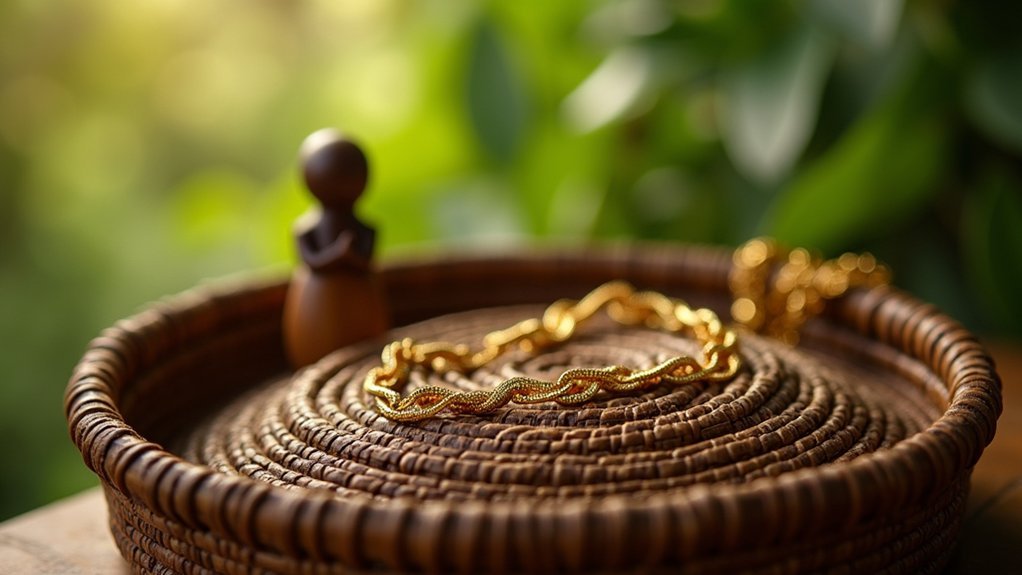
When you choose Fairtrade Gold for your artisan jewelry, you’re directly empowering small-scale mining communities that have historically struggled under exploitative conditions.
Through ethical sourcing, miners receive approximately 99% of gold’s spot value, dramatically improving their financial stability compared to traditional mining arrangements.
Ethical sourcing ensures miners receive nearly full market value, transforming financial outcomes compared to exploitative traditional arrangements.
Fairtrade Gold’s extensive approach transforms mining communities through:
- Fair compensation – Miners earn nearly full market value for their gold
- Community investment – US $2000 per kilo premium funds healthcare and education projects
- Democratic governance – Miners gain decision-making power over their resources
- Environmental protection – Responsible mining techniques reduce harmful practices
Currently, fewer than 15,000 small-scale miners globally benefit from these programs, making your support essential for expanding this ethical framework and creating lasting positive change in impoverished mining communities.
The Hidden Truth Behind “Certified Recycled” Gold Claims
You’ve likely seen “certified recycled” gold marketed as an ethical choice, but these labels don’t tell you where the gold originally came from.
The certification only applies to the refining process, not whether the gold was mined using slave labor or caused environmental devastation.
Many jewelers simply buy discounted scrap gold and rebrand it as eco-friendly, prioritizing profit margins over genuine ethical sourcing.
Misleading Certification Standards
How can you trust gold labeled as “certified recycled” when the certification often means nothing more than a refiner’s stamp of approval?
These misleading certification standards exploit consumers who believe they’re making ethical choices. The recycled gold industry profits from confusion while genuine ethical sourcing initiatives suffer.
Understanding these deceptive practices protects you from greenwashing:
- Refiners mark up prices greatly, making recycled gold expensive while providing minimal transparency about origins.
- “Certified” doesn’t guarantee ethical mining practices or environmental responsibility in the original extraction.
- Mercury pollution and human rights abuses can still be embedded in recycled gold’s history.
- Fairtrade Gold offers genuine traceability and directly supports mining communities through fair wages.
Choose authentic certification that creates real impact instead of falling for industry marketing tactics.
Profit Over Ethics
Behind these deceptive certification practices lies a simple truth: the recycled gold industry prioritizes profits over genuine ethical impact.
When you purchase recycled gold, you’re often paying inflated prices due to refiners’ markups, making ethical sourcing less accessible to everyday consumers. This profit over ethics approach undermines the jewelry market’s potential for meaningful change.
While refiners profit from marketing “eco-friendly” narratives, they’re not addressing the core issues of responsible mining.
Your money doesn’t reach small-scale mining communities that desperately need support. Instead, you’re funding a system that obscures gold’s true origins and avoids accountability.
Fairtrade Gold offers a transparent alternative that directly empowers impoverished miners while ensuring genuine ethical sourcing practices throughout the supply chain.
Supporting Small-Scale Miners Through Ethical Purchasing Decisions
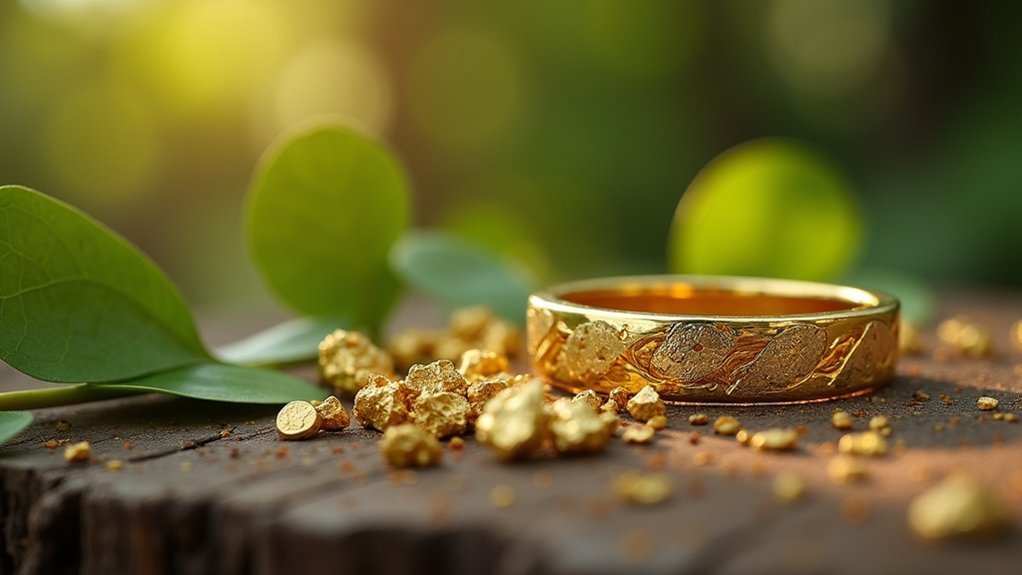
When you choose ethical gold for your artisan jewelry, you’re directly empowering small-scale miners who receive about 99% of spot value for their gold—a stark contrast to traditional mining systems that leave them with considerably less.
Your ethical purchasing decisions create meaningful change for mining communities worldwide.
Supporting small-scale miners through ethically sourced gold transforms entire communities:
- Fair trade premiums provide approximately $2000 per kilo for community healthcare, education, and infrastructure investments.
- Environmental protection reduces waste from 100,000 pounds to just 500 pounds of tailings per gold ounce.
- Mercury pollution elimination protects both miners and surrounding ecosystems from harmful contamination.
- Economic empowerment reaches fewer than 15,000 miners currently, making your choices critically important.
Your purchasing power drives positive change.
Identifying Legitimate Ethical Gold Suppliers for Your Business
Understanding your impact as a conscious buyer naturally leads to the next step: finding suppliers who genuinely uphold these ethical standards.
You’ll want to verify certifications like Fairtrade Gold or Fairmined Gold, which guarantee sustainable and ethical practices alongside fair labor conditions.
Look for suppliers offering complete transparency about their sourcing, including detailed documentation of gold origins and mining conditions.
Demand full transparency from suppliers with comprehensive documentation proving ethical gold sourcing and responsible mining practices.
Prioritize those supporting community development and providing miners with fair wages.
Assess their environmental policies to confirm they use sustainable techniques while avoiding harmful practices like mercury use.
Research supplier reputations through customer reviews and industry endorsements.
Many reputable jewelry brands now partner with certified ethical suppliers, and you can learn from their sourcing decisions.
Consider suppliers incorporating recycled materials into their operations for additional environmental benefits.
The Difference Between Recycled and Newly Mined Ethical Gold
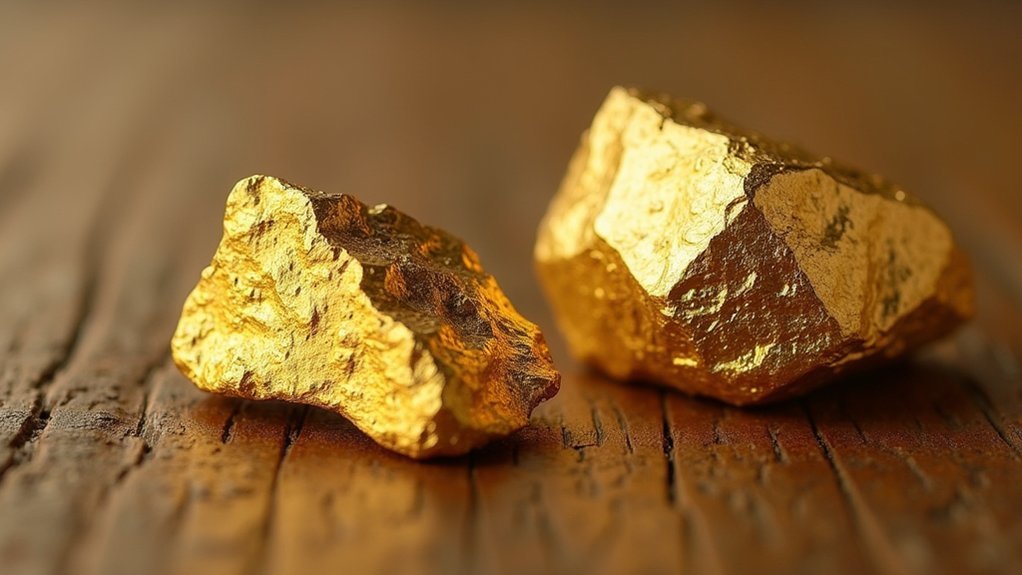
When you’re choosing ethical gold for your artisan jewelry, you’ll face a key decision between recycled and newly mined options, each offering distinct benefits.
Recycled gold reduces demand for new mining operations, but it can’t assure traceability or that your purchase directly supports fair labor practices.
Newly mined ethical gold from Fairtrade and Fairmined certified sources ensures miners receive fair wages and empowers mining communities, though fewer than 15,000 small-scale miners currently benefit from these programs.
Recycled Gold Benefits
Two distinct paths lead to ethical gold for your artisan jewelry: recycled gold and newly mined ethical gold.
When you choose recycled gold, you’re selecting a sustainable option that dramatically reduces environmental destruction while maintaining exceptional quality and purity.
Recycled gold offers compelling advantages for ethical jewelry:
- Environmental Impact: Produces only 500 pounds of mine tailings compared to 100,000 pounds from traditional mining operations.
- Resource Conservation: Eliminates demand for new mining, preventing deforestation and toxic mercury contamination.
- Fair Labor: Avoids exploitation and unsafe working conditions associated with conventional mining practices.
- Quality Assurance: Matches the purity and aesthetic appeal of newly mined gold without compromise.
You’ll support a circular economy that conserves natural resources while creating stunning artisan pieces.
Fairtrade Mining Impact
While recycled gold offers environmental benefits, Fairtrade Gold creates direct positive impact for mining communities worldwide. When you choose Fairtrade Gold, you’re supporting small-scale miners who receive approximately 99% of gold’s spot value, markedly improving their livelihoods compared to traditional mining earnings.
Beyond fair pricing, Fairtrade Gold provides a community premium of $2000 per kilogram, funding essential healthcare, education, and sustainable development projects.
Unlike recycled gold, which can’t guarantee its original sourcing ethics, Fairtrade Gold requires complete certification and traceability from mine to market.
Your choice matters greatly since fewer than 15,000 small-scale miners currently benefit from Fairtrade programs. By selecting Fairtrade Gold over recycled alternatives, you’re directly empowering impoverished mining communities through verified ethical practices and meaningful economic opportunities.
Mercury Pollution and Health Risks in Conventional Gold Mining
Although conventional gold mining produces the precious metal that adorns our jewelry, it creates devastating mercury pollution that threatens human health on a global scale.
When you purchase traditionally mined gold, you’re inadvertently supporting practices that contaminate water sources and endanger communities worldwide.
The health risks from gold mining are staggering:
- Neurological Damage – Mercury exposure causes tremors, cognitive impairments, and developmental issues in children.
- Birth Defects – Approximately 300,000 babies are born annually in the U.S. affected by mercury exposure.
- Community Contamination – Local water sources become toxic, affecting entire populations near mining sites.
- Ecosystem Disruption – Contaminated fish and water supplies create widespread food safety concerns.
Choosing ethical gold protects vulnerable communities from these preventable health crises while ensuring your jewelry reflects responsible sourcing practices.
How Artisan Jewelers Can Verify Their Gold Sources
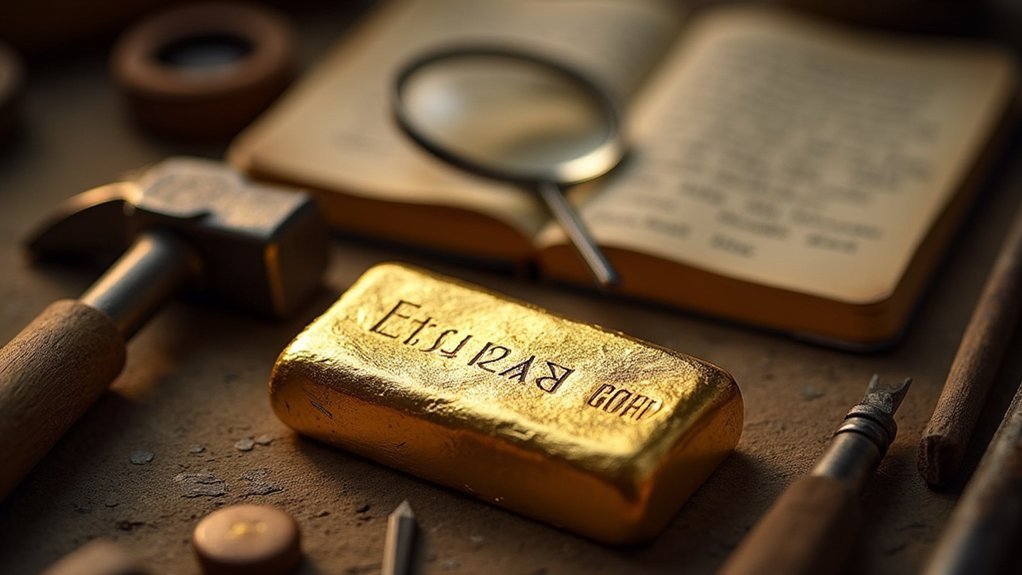
Because ethical sourcing requires rigorous verification, you can’t simply trust suppliers who claim their gold is “responsibly mined” without proper documentation.
You’ll need recognized certifications like Fairtrade Gold and Fairmined Gold, which guarantee fair labor practices and ethical standards.
Consider engaging directly with small-scale mining communities to gain firsthand knowledge of your gold’s origin while supporting sustainable practices.
Recycled gold from reputable refiners offers another verification path, as they trace materials back to their sources.
You should conduct thorough research on suppliers and demand transparency regarding their sourcing practices to avoid “dirty gold.”
Implementing a chain-of-custody system enhances traceability, allowing you to confidently showcase your materials’ ethical origins to conscious consumers who value responsible jewelry.
The Economic Benefits of Choosing Fairtrade Gold
When you invest in Fairtrade Gold, you’re not just making an ethical choice—you’re supporting a revolutionary economic model that transforms miners’ lives. Unlike traditional mining arrangements that leave workers with minimal profits, Fairtrade Gold guarantees miners receive approximately 99% of gold’s spot value.
Here’s how your ethical gold purchase creates lasting economic impact:
- Fair Pricing: Miners earn nearly the full market value instead of meager traditional profits.
- Community Premiums: Each kilo generates $2000 for local healthcare and education projects.
- Democratic Investment: Mining communities decide how to invest in their futures.
- Sustainable Growth: Less than 15,000 miners currently participate, revealing enormous expansion potential.
Your purchasing decisions directly empower impoverished mining communities while building more equitable supply chains.
Certifications and Standards That Guarantee Ethical Gold Sourcing
When you’re selecting gold for your artisan jewelry, you’ll need to understand the specific standards that certify ethical sourcing practices.
Fairtrade Gold certification requires miners to meet rigorous social, environmental, and labor criteria while guaranteeing fair wages and community investment.
You should also familiarize yourself with certification body requirements, as organizations like the Responsible Jewelry Council maintain strict auditing processes that verify compliance throughout the entire supply chain.
Fairtrade Gold Standards
While the gold market has historically exploited miners and communities, Fairtrade Gold certification transforms this dynamic by establishing rigorous standards that secure ethical sourcing from mine to market.
When you choose Fairtrade Gold for your artisan jewelry, you’re supporting sustainable mining practices that protect both people and the environment.
The Fairtrade Gold standard creates meaningful impact through:
- Fair pricing – Miners receive 99% of spot value, dramatically increasing their earnings
- Community premiums – Additional $2000 per kilo funds local healthcare and education projects
- Democratic governance – Mining communities make collective decisions about development investments
- Supply chain traceability – Complete transparency guarantees no human rights abuses occur
You’ll know your jewelry supports miners who earn living wages while protecting their communities and environment.
Certification Body Requirements
Behind these transformative Fairtrade standards lies a network of certification bodies that enforce strict requirements to guarantee your gold meets the highest ethical standards.
These organizations conduct rigorous audits and assessments of mining operations, ensuring complete traceability from mine to market. You’ll find that certified gold can be tracked back to its source, providing transparency that traditional sourcing lacks.
Certification bodies mandate adherence to environmental standards that promote sustainable mining practices while reducing mercury pollution. They require miners to receive fair wages and work in safe conditions.
The Responsible Jewelry Council focuses specifically on human rights compliance and labor standards. Through regular monitoring, these certification bodies provide accountability, giving you confidence that your artisan jewelry purchase supports ethical practices and environmental responsibility.
Building Consumer Trust Through Transparent Gold Supply Chains
As consumers increasingly demand accountability from jewelry brands, transparent gold supply chains have become essential for building lasting trust between artisans and their customers.
When you can trace your gold’s origins, you’re reassured about the ethical implications of your purchase. Ethical gold supply chains guarantee fair labor practices, protecting miners from exploitation and unsafe conditions.
Here’s how transparent sourcing builds trust:
- Verifiable Origins – You can track exactly where your gold originated.
- Certified Standards – Fairtrade and Fairmined certifications provide verified assurances.
- Environmental Impact – Recycled gold reduces ecological footprint from traditional mining.
- Community Support – Transparent sourcing claims often indicate community development initiatives.
Understanding your jewelry’s impact on mining communities creates stronger connections between you and artisans, promoting informed purchasing decisions.
Making the Business Case for Ethical Gold in Artisan Jewelry
Beyond building customer trust, ethical gold sourcing creates compelling financial advantages for artisan jewelry businesses.
You’ll differentiate your products in a crowded marketplace by appealing to consumers who increasingly demand sustainable and socially responsible options. This positioning enhances brand loyalty and justifies premium pricing.
Ethical gold also aligns your business with meaningful community development initiatives. When you source Fairtrade Gold, miners receive 99% of spot value plus $2000 per kilo in community premiums for local healthcare and education projects.
You’re not just selling artisan jewelry – you’re offering customers a story of positive impact.
Additionally, ethical sourcing reduces environmental harm since small-scale operations generate considerably less waste than large mining corporations, producing only 500 pounds of tailings per ounce.
Frequently Asked Questions
What Is Ethical Gold Jewelry?
You’ll find ethical gold jewelry uses responsibly sourced gold from mines following fair labor practices and sustainable methods. It’s traceable, guarantees miners receive fair compensation, and minimizes environmental damage like mercury pollution and habitat destruction.
What Does “Ethically Sourced Jewelry” Mean?
You’re choosing jewelry made from materials obtained through responsible practices that guarantee fair labor conditions, transparent supply chains, minimal environmental impact, and support for mining communities while avoiding conflict minerals and exploitation.
What Is the Most Ethical Gold?
You’ll find Fairtrade and Fairmined certified gold most ethical. It guarantees miners receive 99% of spot value plus community premiums, assures traceable origins, and supports environmentally responsible small-scale operations over destructive industrial mining.
Is Buying Gold Ethical?
You can buy gold ethically by choosing Fairtrade or Fairmined certified suppliers. These guarantee miners receive fair wages while avoiding “dirty gold” that harms workers and communities through mercury pollution.
In Summary
You’re making a powerful statement when you choose ethical gold for your artisan jewelry. You’re supporting sustainable mining practices, protecting vulnerable communities, and reducing environmental damage. You’re also building trust with conscious consumers who value transparency and responsibility. By investing in fairtrade or certified recycled gold, you’re not just creating beautiful jewelry—you’re contributing to a more equitable and sustainable future for the entire industry.

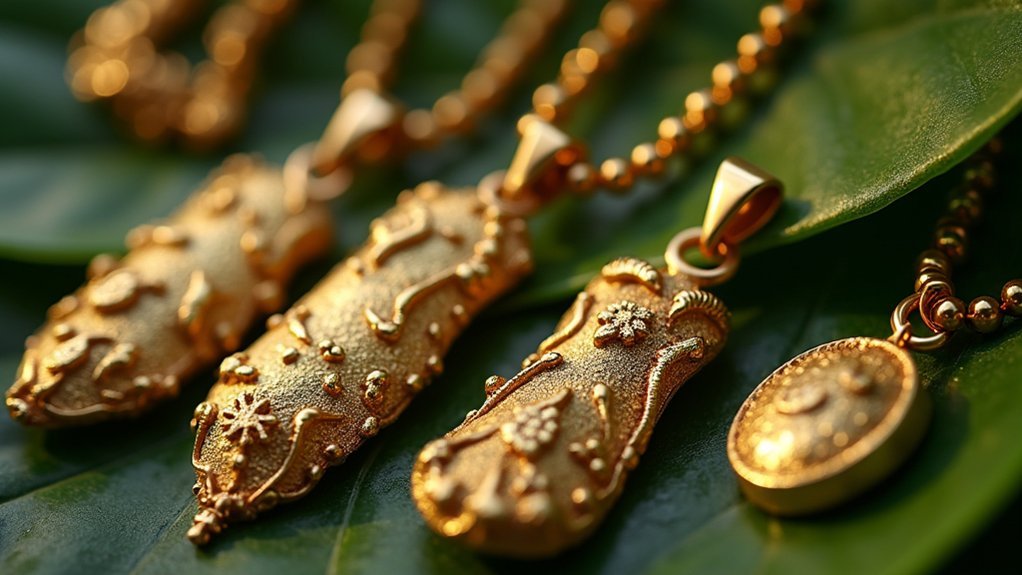

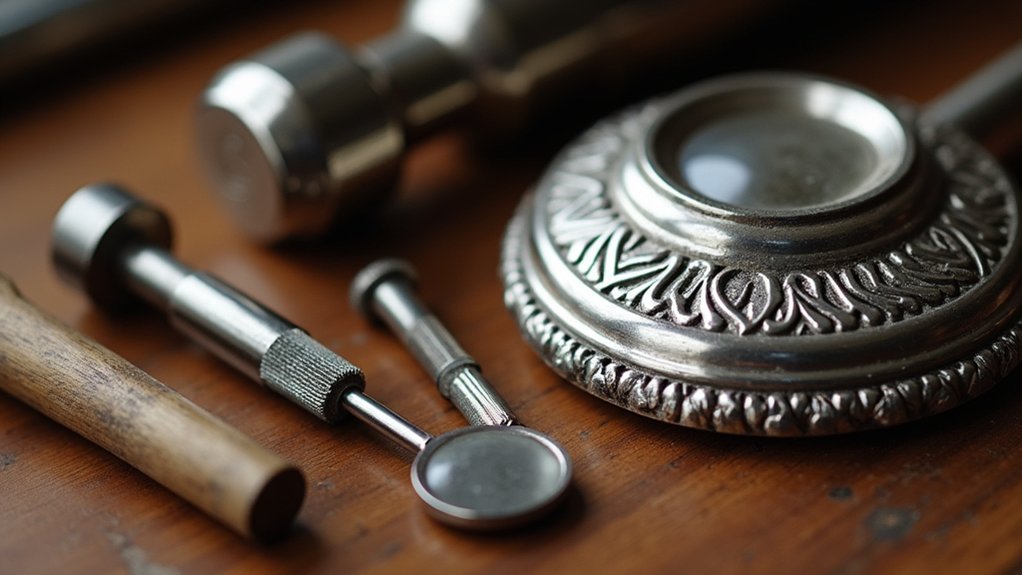
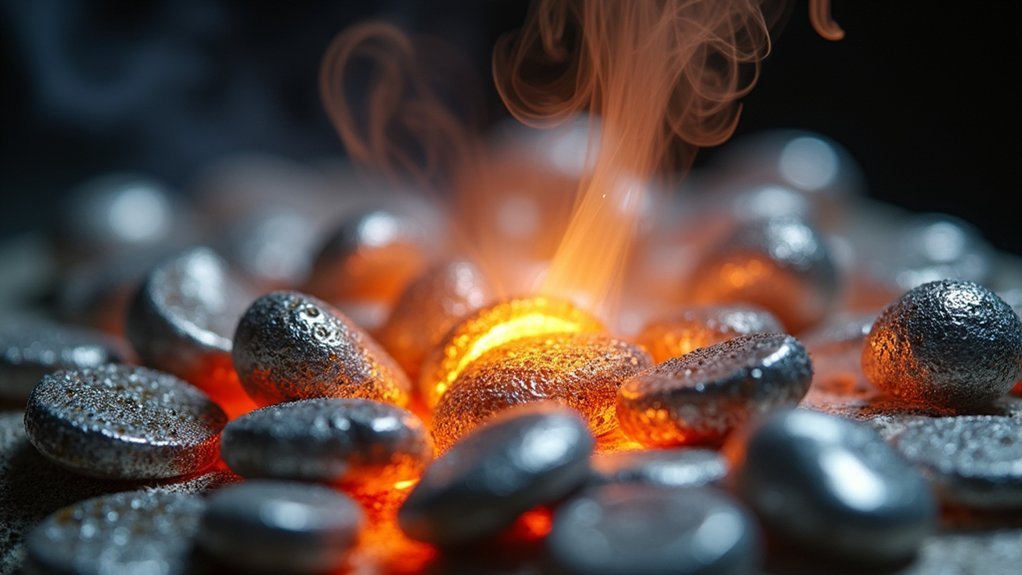
Leave a Reply